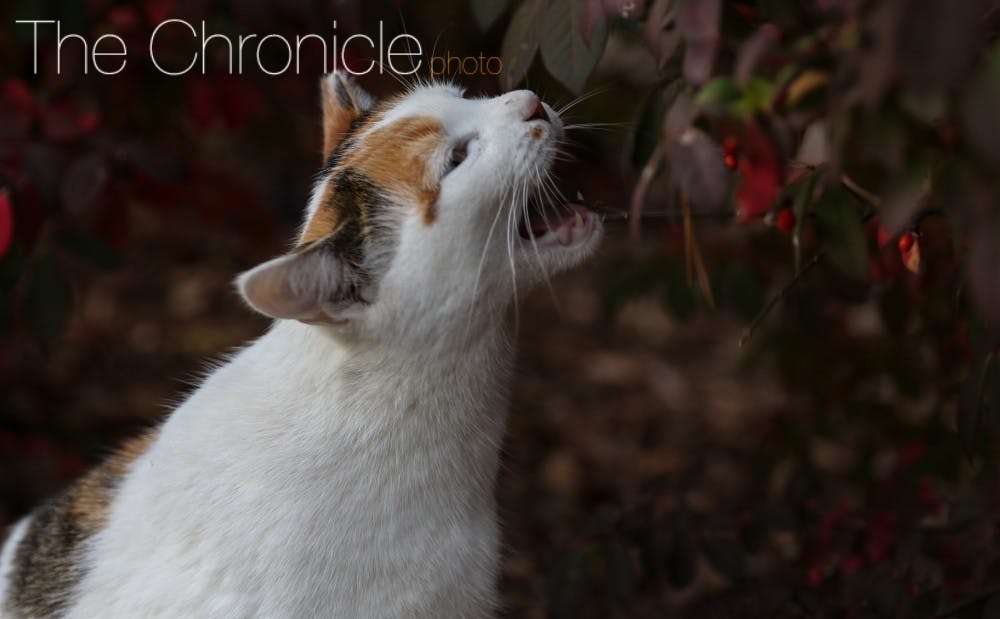After a wave of wintry weather hit Duke last week, students took it upon themselves to care for a calico cat who lives on West Campus.
The cat, commonly known as Peaches, lives near Few Quadrangle where students have provided makeshift shelters and food. Junior Anna Li, a Few Quad resident assistant, created a Facebook group called “Caretakers of Peaches (The Calico Cat)” after she could not find Peaches during the winter storm and feared the cat was “either dead or just suffering out the night.”
“I've kind of thought we've needed a group like this for a while now,” Li said. “I've noticed a lot of times people feed her and then other people feed her, and I wished there was a way for us to all connect with each other because I knew we all cared about her. Like what if she got sick?”
Since its creation Jan. 8, the Facebook group has expanded in a way Li said she could not have imagined. The group had 257 members as of Tuesday.
“Previously, it had largely been guesstimating,” said sophomore Anna Matthews, a member of the group. “There was a period [last year] where Peaches was gone for two weeks, and I was worried she had gotten stuck somewhere.”
Matthews said she was worried Peaches may have gotten locked in a “closet or garden shed” and said having a group in such a scenario would have been “extremely helpful.”
“Once the Facebook group was created, her location kept getting updated, so if you wanted to go see her, you could,” sophomore Alexandra Sánchez Rolón wrote in an email. “There's also a sense of moral responsibility now, because if we know where she is, we have the ability to choose whether to help her if she needs it or not.”
Last Wednesday, Li and Matthews created a GoFundMe page with a goal of raising $300 toward providing veterinary treatment to “a general campus cats fund with a focus on Peaches,” Li said. As of Monday, the campaign had raised $47. But as of Tuesday evening, the campaign had exceeded its goal with $375.
After Peaches resurfaced following the snowstorm, Li said she noticed the cat was moving slower, had gastrointestinal distress and communicated with a “raspier meow.” Matthews noted that some funds will be used for deworming Peaches and MamaBean, another calico cat that lives near Wannamaker dormitory.
“What you end up worrying about is an amalgamation of factors—cold weather, disease, worms, other animals—and if the cats eat rotting food, they can get parasites,” Matthews said, recalling that a cat died last year “probably due to a mix of disease and worms and just stress of cold weather.”
Matthews noted that she and Li intend to bring Peaches and MamaBean to a veterinarian.
“We know that they're spayed, but we don't know if they have their rabies shots,” Matthews said. “A couple weeks ago in the 'All Duke' [Facebook] page, people were like 'I saw a fox on campus, and I think it might be rabid' because you don't normally see wildlife unless it's rabid.”
Li noted that Peaches has hunted rodents and birds in the past, increasing the cat’s risk of becoming rabid.
The success of the GoFundMe campaign will determine the extent of treatment, Li said. Getting Peaches vaccinated for rabies is the students' first priority.
However, Sánchez Rolón suggested other community issues should receive attention as well.
“If we can afford to GoFundMe about $300 for one of our cats, can we also afford to GoFundMe similar amounts for homelessness in Durham?” she wrote. “It'd be nice to extend our generosity to more people and beings. That's not to knock what we're doing, but more to question that if we're able to do this, can we do more?”
Matthews acknowledged other cats on campus—such as ones living near Old Chemistry, the Allen Building or the Bryan Center—but said that it was infeasible to give them veterinary treatment because they were more skittish and would likely require a cage to capture.
“Peaches is the only one I would be concerned about transmitting [rabies] to people, to be honest,” Li said. “The other cats are more feral. They are kind of aloof. MamaBean is the only one that comes close to interacting with people besides Peaches. We were hoping to get her rabies vaccinated too.”
Due to the sociability of Peaches, MamaBean and Bootsie—a gray cat near the Allen Building—Matthews believes they could be adopted.
“Though people like to argue it's mean to keep cats locked up, it's really not,” she said. “As long as you play with them, they're much more comfortable [and] live much longer if they live indoors.”
Although most cats on campus have been spayed and neutered—leading to a “dwindling” cat population—Matthews noted that Duke is considered a “dumping ground,” so a colony of kittens could arise if outside individuals released their un-neutered cats on campus.
With posts already reporting that Peaches has appeared “sluggish” recently, Matthews said she hopes that the community can continue to grow and report troubles for all the cats on campus.
“If anything happens to the cats, they kind of have all these adoring Duke students as their backup,” Li said. “I think if there was some sort of big medical need, I'm sure we would all chip in enough to get that taken care of—it’s kind of like a Peaches fan club.”
Get The Chronicle straight to your inbox
Signup for our weekly newsletter. Cancel at any time.

